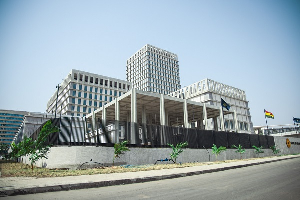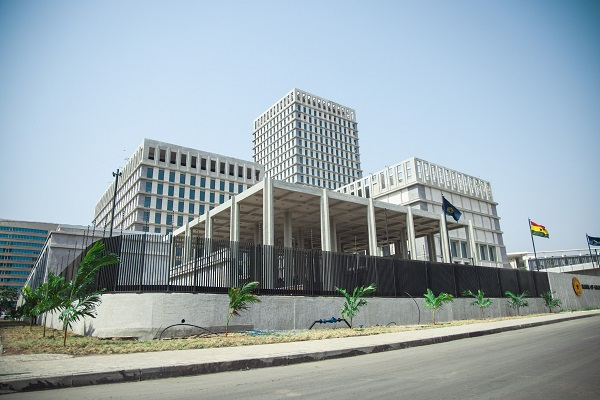 Bank of Ghana Headquarters
Bank of Ghana Headquarters
The Bank of Ghana (BoG) incurred a cost of GH¢8.6billion in 2024 for its open market operations (OMO), making it one of the primary contributors to the central bank’s annual operating loss of GH¢9.49billion.
The operations, aimed at mopping up excess liquidity to contain inflation and restore macroeconomic stability, underscore the steep financial cost of tight monetary policy in a fragile fiscal environment.
Per the bank’s 2024 annual report, the GH¢8.6billion OMO cost in 2024 represents a modest increase over the GH¢8.37billion recorded in 2023. This increase reflects sustained interest expenses arising from the issuance of central bank securities and sterilisation instruments used to absorb liquidity from the banking system.
BoG sterilisation efforts absorbed a total of GH¢134billion in liquidity throughout 2024. This intensive liquidity mop-up – amounting to 1.7 percent of GDP – was instrumental in sustaining macroeconomic stability, even though it was not a direct driver of GDP growth.
Ghana’s real GDP expanded by 5.7 percent in 2024, supported mainly by structural gains in the industrial (7.1 percent), services (6.1 percent) and agriculture (2.8 percent) sectors. Key contributors included mining, construction, crop production and digital communications, rather than monetary policy interventions.
While OMO activity played a stabilising role in curbing inflation and anchoring expectations, its sterilisation intensity declined in 2024 compared to 2023 when liquidity absorption reached the equivalent of 3 percent of GDP.
The moderation reflects the central bank’s more measured tightening stance following the sharp disinflation achieved in 2023 – from a peak inflation rate of 54.1 percent to 23.2 percent. Inflation in 2024 remained elevated but relatively stable, fluctuating between 23 percent and 25 percent.
Despite the narrowing gap in sterilisation efforts, BoG continued to invest in liquidity control tools during 2025. The central bank absorbed GH¢15.5billion in February, GH¢21.6billion in March and GH¢33.3billion in April – setting a record high for monthly liquidity absorption.
The scale of these operations was facilitated by enhanced policy instruments, including the introduction of a 273-day sterilisation bill designed to lock in excess liquidity as well as a revised cash reserve ratio framework aimed at improving monetary policy transmission.
Nevertheless, the financial costs associated with these tools continue to weigh on the central bank’s balance sheet. As of 31 December 2024, BoG reported total assets of GH¢215.06billion against total liabilities of GH¢276.38billion – resulting in a negative equity position of GH¢61.32billion, slightly lower than the GH¢65.34billion deficit reported in 2023.
The central bank’s operating income rose to GH¢9.4billion in 2024, up from GH¢8.71billion in the previous year. This improvement was driven by increased interest earnings on domestic securities, regulatory fines and other service charges. However, these gains were offset by total operating expenses of GH¢18.88billion, a figure that declined from the GH¢21.96billion recorded in 2023.
The reduction in expenses was largely attributed to reclassification of exchange gains into other comprehensive income, rather than lower policy operation costs.
A significant contributor to the overall loss in 2024 was also the central bank’s participation in the Gold for Oil (G4O) programme. The BoG committed GH¢4.69billion in seed capital to support the scheme but recorded a loss of GH¢1.82billion from the programme in 2024 alone. Cumulative losses from the G4O programme now stand at over GH¢2.1billion.
In light of these sustained losses, the board of directors approved the bank’s withdrawal from the programme in March 2025.
Against this backdrop, the BoG, the Ministry of Finance, and the International Monetary Fund reached an agreement on recapitalisation, formalised in a Memorandum of Understanding signed on 6 January 2025. The agreement is aimed at rebuilding the central bank’s financial buffers while maintaining its operational independence.
The BoG’s financial statements for 2024 were prepared on a going concern basis. According to the board of directors, the bank remains policy solvent – meaning it can continue to cover the costs associated with monetary policy operations through its realised income, despite the erosion of its equity.
“The Bank will continue to operate efficiently and effectively on a going concern basis and achieve its policy mandates,” the board stated in the report, citing expectations of improved macroeconomic conditions, falling interest rates and lower inflation.
These factors are anticipated to reduce both the cost of open market operations and foreign exchange revaluation losses, which together have historically accounted for nearly 69 percent of operating expenses.
Under the current IMF programme, the bank has committed to refraining from monetary financing of government’s budget in adherence to the zero-financing agreement signed with the Ministry of Finance. It also intends to optimise its investment portfolio and reduce operational costs to improve profitability and eventually rebuild its equity position.
